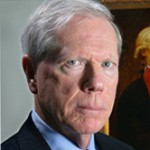
Special Guest: Chris Casey – Managing Director, WindRock Wealth Management
FRA Co-Founder, Gordon T. Long interviewed Chris Casey of Windrock Wealth Management on the concept of inflation and other applications of Austrian economics to investment theory. Mr. Casey, an Austrian economist, is a frequent speaker and writer on macroeconomic topics and their related investment implications.
WHAT IS AUSTRIAN ECONOMICS AND WHY DOES IT MATTER?
The Austrian school offers the “most realistic interpretation” of society and economics according to Mr. Casey. Gordon agrees in noting that “mathematical models are only as good as their assumptions.” While equations and models may be useful as a construct to frame concepts, any social science cannot be scientifically tested due to the inability to control the countless variables at work. As such, Mr. Casey prefers the Austrian approach which “looks at basic self-evident axioms as it relates to mankind in nature and then uses deductive reasoning to describe how the real world works.” According to Mr. Casey, the unique Austrian explanations of inflation and the business cycle (recessions) have direct applications to practical investment ideas.
THE AUSTRIAN EXPLANATION OF RECESSIONS
Most mainstream economists believe recessions are inherent to capitalism since their repeated cycles largely began during the industrial revolution. The Austrian school recognizes a different causation occurring at the same time: fiat money with or without central banking. By artificially increasing the money supply through fiat money, interest rate levels are temporarily lowered. This incents businesses and individuals to make investment decisions they would not otherwise have made: in short, malinvestments. Recessions to liquidate the inevitably follow monetary mischief.
THE AUSTRIAN EXPLANATION OF INFLATION
The Keynesian school of economics has two theories of inflation which fail to comport with reality and are theoretically faulty. Their “demand-pull” explanation requires full employment and full capacity in an economy, but Mr. Casey demonstrates that fails to account for a doubling of prices during the 1970’s during economic weakness.
The “cost-push” theory is equally wrong. By blaming a particular price increase in a commodity such as oil for all price increases, it would have predicted pronounced inflation and deflation over the last 15 years as the oil price gyrated wildly. In addition, it is theoretically faulty as more money spent on oil means less money is spent on other goods and services – which lowers their prices and renders the overall price level largely unaffected.
“Prices are merely a function of the supply and demand for money” states Mr. Casey. More supply means dollars are worth less while higher demand lowers prices as people seek to increase cash balances by selling goods and services through lower prices.
WHEN WILL WE EXPERIENCE INFLATION?
Mr. Casey believes that “once we have another downturn, the Fed . . . will step right in. Once we have that . . . we’ll really start to see the inflation take off.”
What will the Federal Reserve’s next move be? They have other options besides another round of quantitative easing. Mr. Casey notes they may stop paying interest on excess reserves held by commercial banks at the Federal Reserve, and they may also lower the reserve requirement which could have a pronounced and immediate impact on increasing the supply of money.
WHAT SHOULD INVESTORS DO?
“Timing is everything, so utilize investments which pay well now, but in an inflation will be a home run.”




 10/30/2015 - Chris Casey: The Austrian Case for Inflation
10/30/2015 - Chris Casey: The Austrian Case for Inflation































